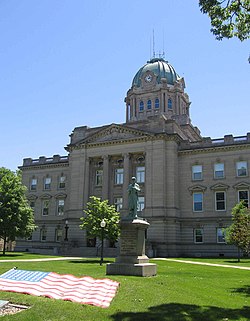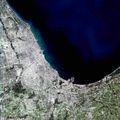2020 census
As of the 2020 census, the county had a population of 107,502. The median age was 39.6 years. 22.8% of residents were under the age of 18 and 17.6% of residents were 65 years of age or older. For every 100 females there were 96.2 males, and for every 100 females age 18 and over there were 94.1 males age 18 and over. [12] [13]
The racial makeup of the county was 71.0% White, 14.5% Black or African American, 0.4% American Indian and Alaska Native, 1.0% Asian, <0.1% Native Hawaiian and Pacific Islander, 5.8% from some other race, and 7.2% from two or more races. Hispanic or Latino residents of any race comprised 11.6% of the population. [13]
71.6% of residents lived in urban areas, while 28.4% lived in rural areas. [14]
There were 41,528 households in the county, of which 30.6% had children under the age of 18 living in them. Of all households, 45.4% were married-couple households, 18.5% were households with a male householder and no spouse or partner present, and 28.5% were households with a female householder and no spouse or partner present. About 28.0% of all households were made up of individuals and 12.5% had someone living alone who was 65 years of age or older. [12]
There were 45,270 housing units, of which 8.3% were vacant. Among occupied housing units, 68.0% were owner-occupied and 32.0% were renter-occupied. The homeowner vacancy rate was 2.0% and the rental vacancy rate was 8.9%. [12]
2010 census
As of the 2010 United States census, there were 113,449 people, 41,511 households, and 28,680 families residing in the county. [24] The population density was 167.7 inhabitants per square mile (64.7/km2). There were 45,246 housing units at an average density of 66.9 per square mile (25.8/km2). [4] The racial makeup of the county was 77.6% white, 15.1% black or African American, 0.9% Asian, 0.3% Native American, 4.0% from other races, and 2.1% from two or more races. Those of Hispanic or Latino origin made up 9.0% of the population. [24] In terms of ancestry, 26.5% were German, 14.2% were Irish, 7.4% were English, 6.7% were Italian, 5.8% were Polish, and 3.6% were American. [25]
Of the 41,511 households, 35.2% had children under the age of 18 living with them, 49.1% were married couples living together, 14.7% had a female householder with no husband present, 30.9% were non-families, and 25.5% of all households were made up of individuals. The average household size was 2.61 and the average family size was 3.13. The median age was 36.7 years. [24]
The median income for a household in the county was $50,484 and the median income for a family was $59,998. Males had a median income of $49,858 versus $32,247 for females. The per capita income for the county was $22,888. About 10.8% of families and 15.0% of the population were below the poverty line, including 20.6% of those under age 18 and 8.4% of those age 65 or over. [26]





